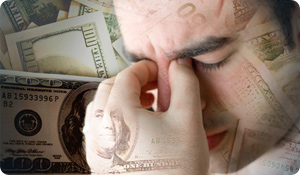
There's no doubt, America is suffering from the economic downturn. Stress levels are through the roof. Kitchen tables are groaning under the weight of too many bills. One of the worst side effects of the economy is what it's doing to our health.
Here are six common reasons why health is placed on the backburner during difficult financial times:
The Stress Factor
When times get tough, our body does its best to hold up under stress. It releases hormones like cortisol, epinephrine, and norepinephrine, and activates our nervous system to stay strong during emergencies. When the emergency keeps going though, this stress response wreaks havoc on our immune systems, blood pressure, and mental health. The results are anxiety, depression, asthma, cardiac problems, chronic pain, and other conditions.
Bad Habits
It's natural that people will look for ways to reduce stress, even when it's not healthy. They'll reach for a cigarette, drink, or recreational drugs, just to get some relief. Or maybe they'll numb themselves with television, computer games, or other sedentary activities. Many people find their willpower to choose healthier activities breaks under pressure.
Poor Eating Habits
Healthy food frequently costs more and is more difficult to find and prepare than fast food. Some economically depressed areas of the country constitute food deserts with no supermarkets, farmers markets, or other healthy food venues.
People have to travel for miles out of their own neighborhoods to find anything other than a drive-through. When funds are low, it's cheaper to grab something off the dollar menu down the street than to take a bus across town to a grocery store.
Limited Physical Activity
When you're trimming the budget, gym memberships, after-school sports, and other extras might go. That leads to higher stress levels, bigger waistlines, and all the health issues associated with obesity and sedentary lifestyles.
Lack of Insurance
The majority of Americans' health insurance is provided through work. Studies show that for every one percent increase in unemployment, a million Americans lose their insurance. Even Americans who are employed are often under-insured-meaning their costs are more than they can afford.
Then, there's the fear that using insurance to cover health care costs will result in the insurance company canceling them or increasing their premiums. Fortunately, there's relief on the horizon for this issue when the Affordable Care Act (or the Healthcare Reform Act) goes into full effect.
According to federal analysts, people have been cutting back on medical care in response to the stalled economy. The most recent numbers show that health-care spending slowed to 3.9 percent in 2010, not much more than the record low of 3.8 percent in 2009.
Social Determinants
Countless studies link the impact of poverty on quality of housing, education status, understanding of health, and health care. It's also linked to higher rates of suicide, domestic violence, and crime as people react to increased stress and frustration. This, in turn, increases needs for mental health and social services that are often unavailable to the uninsured.
Not all the news is bad though. Some studies link economic downturns with a rise in people quitting smoking and drinking because they can't afford it. Others walk more and engage in activities like pick-up ball games as free transportation and entertainment. Some families eat more meals at home, resulting in better quality diets and closer family relationships.
While it's unclear how long the economy will struggle, some economists are optimistic that the worst is over and recovery is on its way. Since optimism is also linked to better health, perhaps our best recovery plan is to look at the bright side.
Sources:
US Department of Agriculture. "Access to Affordable and Nutritious Food-Measuring and Understanding Food Deserts and Their Consequences: Report to Congress" Administrative Publication No. (AP-036) 160 pp, June 2009. Multiple contributors. http://www.ers.usda.gov/Publications/AP/AP036/
Steve Cline, DDS, MPH. "Can I afford to be healthy? (PDF)" North Carolina Medical Journal. July/August 2009, Volume 70, Number 4. http://www.ncmedicaljournal.org/Jul-Aug-09/Cline.pdf
Louise Radnofsky. "Weak Economy Curbs Health Spending." The Wall Street Journal. Web. January 10, 1012
http://online.wsj.com/article/SB10001424052970203436904577151033764613376.html





